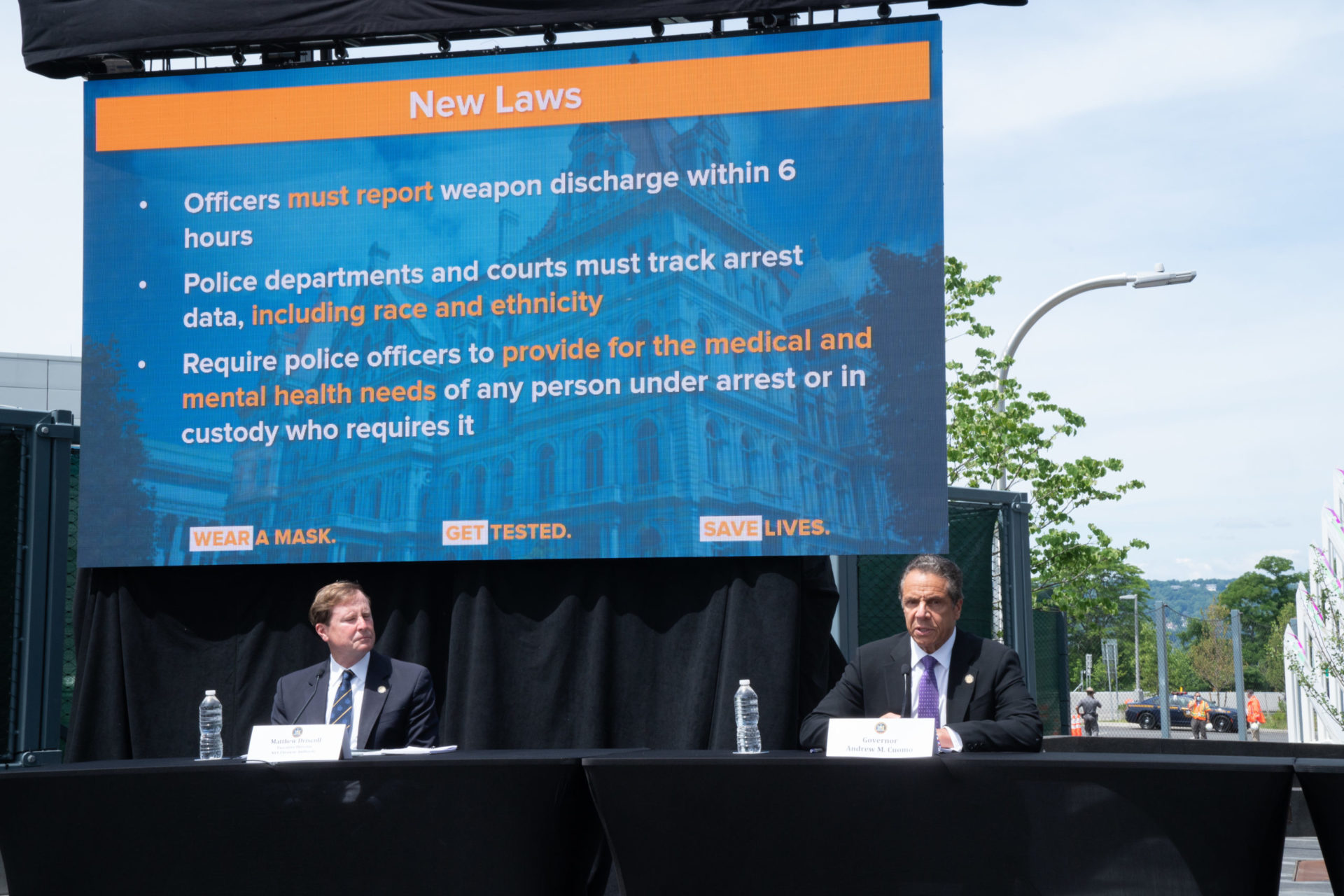New York's Sweeping Police Reform Continues

Governor Andrew Cuomo signed more historic criminal justice reform legislation on Monday, on the heels of the reform legislation passed late last week.
In addition to the repeal of the decades old Section 50-a of the New York State Civil Rights Law that has allowed the police to keep personnel records private and the ban of police chokeholds, three new laws offer even more transparency of police activity.
Any law enforcement officer — on duty or off duty — must now report when he or she discharges their weapon, whether someone was hurt or not, within six hours of the incident. Under other new laws, courts must now compile and publish racial and other demographic data of all low-level offenses, and police officers must provide medical and mental health attention to individuals in custody.
“Police reform is long overdue in this state and this nation, and New York is once again leading the way and enacting real change to end the systemic discrimination that exists in our criminal justice and policing systems,” Cuomo said. “These critical reforms will help improve the relationship between law enforcement and the communities they serve and take us one step closer to righting the many injustices minority communities have faced because of a broken and unfair system.”
Under the Police Statistics and Transparency Act, known as the STAT Act, courts are now required to track — and make public — racial and other demographic data of all low-level offenses, including misdemeanors and violations. The data collected will be made available online and updated monthly, the law states.
Also, the new law mandates police departments to report any arrest-related death to the Department of Criminal Justice Services and to submit annual reports on arrest-related deaths to the governor and the State Legislature.
The STAT Act was a recommendation of President Barack Obama’s Task Force on 21st Century Policing. Senator Brad Hoylman said, who sponsored the STAT Act, “Because of this legislation, we’ll finally have the data necessary to identify and root out the systematic and discriminatory policing practices that law enforcement uses to target Black and Brown New Yorkers.”
In a statement, Hoylman said that Gwen Carr, the mother of Eric Garner who died after an NYPD officer put him in a chokehold in 2014, travelled to Albany to campaign for passage of the STAT Act. “We enact this law in honor of the memory of Ms. Carr’s son,” he said.
The Weapons Discharge Reporting law requires that any law enforcement officer or peace officer, regardless of whether they are working or not, must verbally report an incident in which they discharge their weapon and a person could be struck by a bullet. The officer has six hours to report it verbally to a supervisor. The officer must also file a written report within 48 hours of the incident.
“I would like to thank the Governor for signing this crucial piece of legislation, which it is important to have this transparency within a department to foster a better public trust, ensure accountability, and improve community police relations, ” said Senator Jamaal T. Bailey, who sponsored the bill.
Assemblyman Nick Perry, who also sponsored the bill, said the law should be dedicated to Jayson Tirado, “who lost his life in an outrageous deadly act of police misconduct” in 2007. He said in a statement, “When Police Officer Sean Sawyer with criminal intent pointed his NYPD-issued handgun and pulled the trigger ending Tirado’s life, Sawyer knew he could get away with absolutely no consequence for his wrongdoing-and he did. This law won’t punish him, but its enactment will assure us that the next officer that commits this type of wanton criminal act of being judge, jury and executioner will face some accountability.”
The new law states that police officers, peace officers and other law enforcement representatives and entities may be liable for damages if they do not provide medical attention and a person suffers a serious physical injury or has their injury exacerbated by the lack of care.
“Regardless of whether an individual is in custody or not, if they need medical attention it should be provided to them,” Bailey said. “In far too many of these cases, adequate medical assistance has been denied to these individuals or been so delayed that individuals have suffered needless, pain and suffering. In the most egregious cases, indifference or neglect of some persons’ conditions have even lead to senseless deaths, like that of Andrew Kearse, a young man whose pleas for medical attention went unheard.” In 2017, Kearse died in police custody while in Schenectady.









